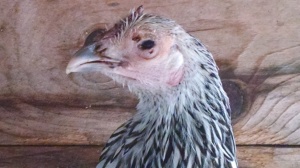There are many reasons why your kienyeji chicken may go blind. For example, they may have suffered an eye trauma following a fight or scratching by other chickens or they may get blind due to diseases such as sinusitis.

A common reason, though, why your chickens may suffer full or partial blindness is due to the effect of ammonia burns caused by poor ventilation.
If the poultry housing is not well ventilated, there will be an accumulation of ammonia gas in the poultry shed. Ammonia is a highly irritating gas and can lead to ammonia burns on the eyes that causes full or partial blindness.
The ammonia burns on the eyes of your chickens will begin with watery eyes and then progress to an accumulation of solidified pus-like substance in the eyes. This will eventually lead to a condition called keratoconjuctivitis.
There are various steps that you can undertake in order to reduce the accumulation of ammonia gas in your poultry house. These include the following:-
- Avoid fully covering the poultry house at night. There are harmful gases and substances emitted by the poultry waste that must be taken out via the ventilation system in the poultry house. These are ammonia gas, carbon-dioxide and even dust. Fresh air from outside also needs to get into the poultry house.
- Make sure that litter in the poultry house is not wet. If the litter is accumulated, remove it after every four weeks and add fresh litter in the poultry house. Water spillage can cause a lot of sanitation problems in the poultry house so these must be removed as quickly as possible.
- The bird should be spaced out well in the poultry house so as to avoid overcrowding. When constructing a poultry house, you must also take into account the number of chickens that you are planning to raise. The size of the poultry house must support the desired stocking density.
Treatment for Blind Chickens
There are certain blindness in chicken that still be reversed while others such as those caused by trauma are irreversible.
For birds affected by ammonia burns, you can use eye ointments such as Probeta or even a tetracycline eye ointment. Make sure that you apply the eye ointment twice a day for three .days and check if you see any improvement. You can also contact your nearest vet.